Harnessing the Power of Cooperation
The 10th Horasis Global Summit convened in São Paulo, Brazil, at a pivotal moment in human history. As we navigate unprecedented global turbulence – from economic asymmetries and geopolitical tensions to the existential challenge of climate change – the imperative for meaningful cooperation has never been more urgent. Under the theme ‘Harnessing the Power of Cooperation’, the meeting drew together an extraordinary assembly of 1000 pioneering entrepreneurs, government ministers, thought leaders and civil society visionaries from 50 countries. Together, they explored how cooperative frameworks can address challenges that transcend national boundaries and societal divisions.
Felício Ramuth, Vice Governor of the State of São Paulo opened the Summit describing São Paulo as a laboratory for the nation’s future, a state whose size and diversity demand inclusive governance. “This is a historic moment to invest in Brazil,” he declared. Jorge Lima, Secretary of Economic Development, State of São Paulo reminded the audience that economic transformation depends as much on ethics as on engineering. “The São Paulo I want is one where every citizen can reach their maximum potential and feel increasingly proud of their State,” he said. Carlos Gilberto Carlotti, Rector of the University of São Paulo, added a distinctly academic cadence to the dialogue. He spoke of the university’s autonomy not as privilege but as public trust.
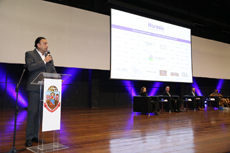 |
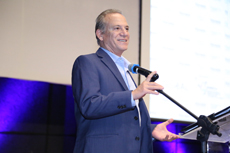 |
| Felício Ramuth, Vice Governor of the State of São Paulo, during the Grand Opening | Jorge Lima, State Secretary for Economic Development, State of Sao Paulo |
The plenary panel Harnessing the Power of Cooperation, examined how collaboration can be translated into effective structures for governance, business, and society. The session was chaired by Kyle Bozentko, Executive Director of the Center for New Democratic Processes in the United States, who emphasized that democracy itself must become more deliberative and inclusive. Maria Cristina Frias, Partner at Grupo Folha in Brazil, discussed the strategic direction of media and journalism’s essential role in promoting understanding among nations. “Good storytelling opens a clear focus in complex issues,” she said, while noting that there is “a decline of cooperation among countries” and a growing polarization of information. Sekai Holland, Chairperson of the Board of Trustees of the Zimbabwe Peacebuilding Initiative and Former Minister of State for National Healing, Reconciliation and Integration of Zimbabwe, closed the discussion by highlighting the moral dimension of cooperation. She emphasized that peace cannot be imposed but must be cultivated through dialogue and respect for history. Bo Inge Andersson, President of Ivanhoe IV in the United States, drew on extensive global experience in the automotive and manufacturing sectors to describe how cooperation underpins supply chains and industrial ecosystems.
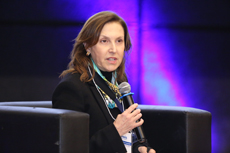 |
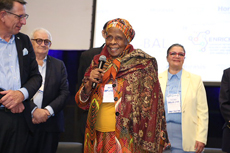 |
| Maria Cristina Frias, Partner, Grupo Folha, Brazil | Sekai Holland, Chairperson of Board of Trustees, Zimbabwe Peacebuilding Initiative |
Chairing a plenary panel on the Global Economic Outlook, Ligia Guimarães, Editor of Valor Econômico in Brazil, who opened by reflecting on the responsibility of economic journalism to provide accuracy and perspective in a volatile world. Lucas Ferraz, Former Secretary of Foreign Trade and Professor at Fundação Getulio Vargas in Brazil, addressed the dynamics of international commerce. From the financial sector, Kaspar Grathwohl, Executive Vice Chairman of UBS in Switzerland, outlined the major trends shaping global wealth management and investment banking. He noted that investors today face a complex intersection of digitalization, demographic shifts, and new forms of risk. Claude Béglé, Chairman of SymbioSwiss in Switzerland, pointed to innovation as the primary driver of future growth. “Innovation is the best opportunity we have to grow the economy,” he said, emphasizing the speed of change driven by digital technologies and Artificial Intelligence. Adding a perspective from Latin America’s banking sector, Alejandro Valenzuela, Chief Executive Officer, Banco Azteca, Mexico, described how financial technology is transforming transactions and consumer behavior. “There is a revolution coming in financial transactions,” he said, “and a key requirement will be cybersecurity.”
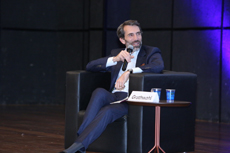 |
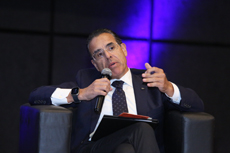 |
| Kaspar Grathwohl, Executive Vice Chairman, UBS, Switzerland | Alejandro Valenzuela, Chief Executive Officer, Banco Azteca, Mexico, one of the meeting co-chairs |
A further plenary panel addressed one of the defining challenges of our time: Rethinking Climate Cooperation. The session was chaired by Nisaa Jetha, Founder, ImpactforSDGs, United Kingdom, whose work focuses on impact strategy, accountability, and the pace of delivery for the United Nations Sustainable Development Goals (SDGs). Sarah Siquieira, Founder, Rampa, Brazil, spoke about the crucial role of scientific research in addressing environmental challenges. Drawing from her experience with collaborative projects at SERC, she emphasized how interdisciplinary science can illuminate the long-term effects of human activity on ecosystems. She urged for stronger links between research institutions, industry, and government to ensure that science guides sustainable policy. Gladys Martínez, Chief Executive Officer, Interamerican Association for Environmental Defense, Costa Rica, expanded the discussion to include marine ecosystems. “With the accelerating climate and biodiversity crises,” she warned, “time is not a luxury – we have to put ocean health back on track.” Adding a humanistic perspective, Juliana Schürmann, Co-founder and President, Impact Coalition Institute, Brazil, reflected on her work as an architect, entrepreneur, and environmental advocate. Her approach focuses on mobilizing people and institutions into collective action. “We need to unite people, ideas, and actions to restore the planet,” she said.
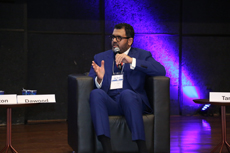 |
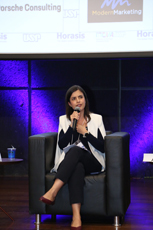 |
| Ahmed Bin Dawood, Chief Executive Officer, BinDawood Holdings, Saudi Arabia | Tabata Amaral, Federal Deputy – one of the youngest elected officials in Brazilian Congress |
The session Leveraging Technology for Humanity’s Progress brought together leaders from journalism, technology, industry, and innovation to examine how digital transformation can be aligned with human values. Drawing on her experience as a journalist operating at the intersection of technology and truth, session chair Jessica Brice, Senior Investigative Reporter, Bloomberg News, USA reflected on the shifting balance between transparency and privacy. Carlos Creus Moreira, Founder and Chairman, WISeKey, Switzerland, built on this idea, warning that digital abundance has created a paradox of disconnection. “We’re getting digital fat,” he said, describing how the overproduction of information risks eroding individual autonomy. Raj Nandwani, Managing Director, Advane, Hong Kong, shifted the discussion toward the moral dimension of technological change. “We need to use technology to build empathy,” he said, “because too often it removes empathy from the world.” From the perspective of industry transformation, Rüdiger Leutz, Managing Director, Porsche Consulting, Brazil, highlighted Brazil’s culture of resilience as a model for adaptive innovation. “Brazilians are not known for sticking their heads in the sand,” he said, “but for pulling together.” Ani Chahal Honan, Founder, Yunity, USA emphasized that technology should serve as an amplifier of human connection, not as its replacement. “We are standing at a threshold,” she said, “where our tools are evolving faster than our collective wisdom.
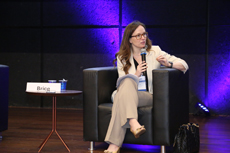 |
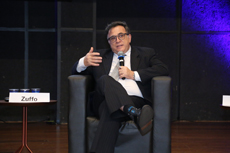 |
| Jessica Brice, Senior Investigative Reporter, Bloomberg News, USA | Marcelo Zuffo making a point on a plenary panel |
The session Achieving Peace in a Fragmented Worl, addressed one of the most urgent and complex challenges facing the international community. Bringing together leaders from government, business, and diplomacy, the session explored how cooperation and accountability can rebuild trust in an era marked by conflict, division, and disinformation. The discussion was chaired by Rhett Power, Forbes Columnist and Chief Executive Officer, Accountability Inc, USA, who began by emphasizing that accountability is not a constraint but the foundation of leadership. Sundeep Waslekar, President, Strategic Foresight Group, India, broadened the conversation to the global level, arguing that the economics of peace are often underestimated. Drawing on decades of work in foresight and conflict resolution, he noted that cooperation and preventive diplomacy can drastically reduce the human and financial cost of wars. Jerry Hultin, Chief Executive Officer, Global Futures Group, USA, added a forward-looking dimension, connecting security to innovation. He argued that technology and peacebuilding must evolve in tandem. From his experience in public service, Tobias Ellwood, Former Minister for Defence and Foreign Affairs, United Kingdom, reminded the audience that peacebuilding also requires compassion toward those who have borne the cost of conflict. Drawing on his work with military veterans, he emphasized that “the physical and mental wounds should be treated the same.” The discussion concluded with a powerful appeal from Her Highness Princess Nisreen El-Hashemite, Executive Director, Royal Academy of Science International Trust, USA, who spoke passionately about equality and dignity as the foundations of peace. She warned that “dialogue is most perilous today, as there is no trust in international cooperation mechanisms,” yet insisted that trust can only be rebuilt through persistent engagement and inclusion.
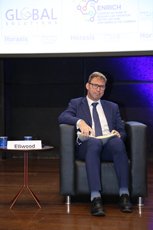 |
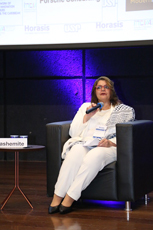 |
| Tobias Ellwood, Former Minister for Defence Veterans, Reserves and Personnel, United Kingdom | HH Princess Nisreen El-Hashemite, Executive Director, Royal Academy of Science Inter. Trust, USA |
The session Shaping Humanity Together set a reflective and aspirational tone. Chaired by Natália Ariede, Anchor, CNBC, Brazil, the session explored what it truly means to design the future of humanity through empowerment, innovation, and inclusion. The speakers approached this question from markedly different worlds – from politics and philanthropy to social entrepreneurship and cultural activism – yet their visions converged on a shared belief: that lasting progress begins with individual agency and collective responsibility. Vít Jedlička, President, Liberland, opened the dialogue with a radical vision of freedom and governance. He spoke of Liberland – a micronation founded on the principles of minimal government and cryptocurrency – as a laboratory for reimagining the relationship between citizens and the state. Picking up the theme of empowerment, David Gershon, Founder, Empowerment Institute Center for Reinventing the Planet, USA, urged participants to shift from problem-solving to possibility-thinking. “If we focus on solutions, or what we want, we gain insight into those,” he said. “It is a more efficient use of our time and enables more dynamic growth to focus on a vision of what we want.” Martín Burt, Founder and Executive Director, Fundación Paraguaya, Paraguay, grounded the discussion in humility and inclusion. “We have to ask the poor what it means for them not to be poor,” he reminded the audience, “and include them in the design process of anti-poverty programs.” Burt’s words brought moral depth to the debate, reminding participants that cooperation must be anchored in listening. From a humanistic and cultural perspective, Indrani Pal-Chaudhuri, Founder, Open Origin, USA, spoke of education and creativity as the universal keys to empowerment. “Whatever you do, wherever you live, and whatever society you’re in, there is so much power you have as an agent of change,” she said. “Each of us has a responsibility to make the world a better place.” Her statement captured the panel’s essence: that humanity’s progress is not the task of institutions alone, but of every individual who chooses to act with awareness and compassion. Bringing an analytical yet impassioned close, Cordell Carter, Founder, The Festival of the Diaspora, USA, called for courage and imagination in philanthropy. Together, the panelists issued a resonant message: humanity’s progress depends on cooperation between freedom and responsibility, innovation and empathy, risk-taking and care.
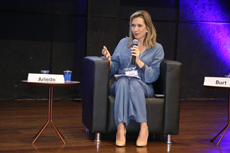 |
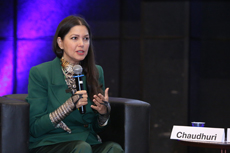 |
| Natália Ariede, Anchor, CNBC, Brazil chairing the plenary panel Shaping Humanity Together | Indrani Pal-Chaudhuri, Founder, Open Origin, USA |
Catherine Carlton, Council Member and Former Mayor, Menlo Park, USA opened the session Co-Creating Solutions for Global Challenge by reflecting on the delicate balance between global innovation and local impact, drawing from her experience at the crossroads of technology and governance in California. “Global players and local communities must grow together,” she emphasized. Ahmed Bin Dawood, Chief Executive Officer, BinDawood Holdings, Saudi Arabia, brought the conversation into the boardroom, where legacy meets transformation. Speaking candidly about family-owned enterprises navigating modern capital markets, he noted, “The majority of family businesses don’t survive the transition to the third generation.” For him, transparency and trust are the new cornerstones of longevity. From the Atlantic, Pedro Lopes, Secretary of State of Digital Economy, Cape Verde, offered a hopeful vision of how small nations can lead through agility and openness. “We believe we can be more flexible and faster than the others,” he said, describing Cape Verde’s emergence as a digital bridge between Africa, Europe, and the Americas. Henry Wang, Founder, Center for China and Globalization, China, placed the discussion in a broader geopolitical frame. “The pandemic revealed not only the failure of globalization,” he said, “but the need to innovate global governance systems and boost international cooperation.” Charles Tang, Chairman, Brazil-China Chamber of Commerce & Industry, Brazil reminded participants of the depth of Brazil’s economic partnership with China. “The benefits for Brazil are incalculable,” he said. “Last year we had almost US$80 billion in trade surplus with China, and the accumulated balance already surpasses US$500 billion. Rounding off the session, Nkululeko Khumalo, Chief Executive Officer, Mbulase Group, South Africa, turned attention to the future. Looking ahead to the G20 Summit in Johannesburg — the first to be held in Africa — he described it as “a realization by global powers that collaboration must extend beyond the usual suspect areas.” Africa, he said, is ready to shape solutions that are globally relevant and locally tested.“
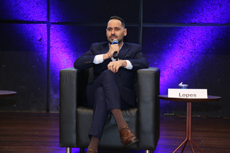 |
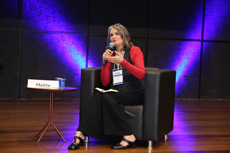 |
| Pedro Lopes, Secretary of State of Digital Economy, Cape Verde | Jojo Mehta, Co-Founder and CEO, Stop Ecocide International, United Kingdom |
The meeting’s summary plenary, Cooperation is a Strength, not a Weakness, brought together an atmosphere of reflection and renewal as delegates considered the key takeaways from three days of dialogue. Chaired by Mariana Luz, Chief Executive Officer, Maria Cecilia Souto Vidigal Foundation, Brazil, the session reaffirmed that cooperation is not merely an ethical ideal but an operational necessity in a world of intertwined risks. Luz, known for her advocacy of early childhood development and social transformation through collective effort, emphasized the urgency of citizen engagement: “Public mobilization is fundamental to a behavior change. The risk that the climate issue can bring to business, in terms of impacting economic returns, is real. Jojo Mehta, Co-Founder and CEO of Stop Ecocide International, framed cooperation within the rule of law, arguing that moral renewal requires legal redefinition. “Criminal law has a particular role to play because we use criminal law to draw moral lines,” she said. “Changing a law doesn’t cost very much money, but the effect is enormous. It would change where investments go, where decision-makers focus, and how we judge right and wrong.” Tabata Amaral, Federal Deputy, Brazil, brought a generational and political dimension to the discussion. One of the youngest elected officials in Brazilian Congress, Amaral has become a voice for democratic renewal and the inclusion of youth in decision-making. She called for rebuilding the social fabric necessary for collective problem-solving: “For cooperation to happen, we need some consensus – and we’ve lost those spaces of consensus-building.” She argued that polarization, amplified by disinformation, weakens societies’ ability to mobilize toward shared goals. Marcelo Zuffo, President of Inova USP and a pioneer of Brazil’s digital transformation, linked these moral and political insights to innovation. He argued that technology must be “socially relevant, not just advanced.” For him, cooperation is the foundation of innovation ecosystems, where academia, industry, and government form a single learning community. Benjamin J. Butler, Founder, Embassy of the Future closed the panel as its rapporteur. A futurist known for his work on global foresight and narrative change, Butler urged participants to see cooperation as an act of imagination: “If you can’t imagine a positive future, how can you create one?” As the plenary drew to a close, several key participants gathered on stage – political leaders, entrepreneurs, and policymakers – symbolically joining hands to reaffirm the spirit that had animated the three days in São Paulo. Their gesture embodied the Summit’s conviction that cooperation is not a passive agreement but a living force, one that grows stronger through shared purpose. The closing moments were marked by a deeply moving song led by Alves de Almedida Katukina Renaldo, Chief and Shaman of the Sacred Village, Peru. His voice, carrying ancestral resonance, filled the hall with a sense of unity that transcended language and geography. As the final notes lingered, delegates stood together in quiet reflection, aware that the challenges ahead are vast – but also that cooperation, as both strength and promise, remains humanity’s most enduring tool for transformation.
The co-chairs were:
| Bo Inge Andersson, President, Ivanhoe IV, USA | |
| Martín Burt, Founder and Executive Director, Fundación Paraguaya, Paraguay | |
| Claude Béglé, Chairman, SymbioSwiss, Switzerland | |
| William Bohnett, Chairman, Smithsonian Environmental Research Center, USA | |
| Cordell Carter, Founder, The Festival of the Diaspora, USA | |
| Ahmed Bin Dawood, Chief Executive Officer, BinDawood Holdings, Saudi Arabia | |
| Kaspar Grathwohl, Executive Vice Chairman, UBS, Switzerland | |
| Maria Cristina Frias, Partner, Grupo Folha, Brazil | |
| David Gershon, Founder, Empowerment Institute Center for Reinventing the Planet, USA | |
| HH Princess Nisreen El-Hashemite, Executive Director, Royal Academy of Science International Trust, USA | |
| Fahim Hashimi, Chairman, Hashimi Group; Former Minister of Communications and Information Technology Afghanistan | |
| Maliha Hashmi, Managing Partner and Chief Executive Officer, MNH, Saudi Arabia | |
| Anabel Ternès von Hattburg, Princess of Prussia; CEO, Experts for Life, Germany | |
| Sekai Holland, Chairperson of Board of Trustees, Zimbabwe Peacebuilding Initiative, Zimbabwe | |
| Brittany Kaiser, Co-Founder, Own Your Data Foundation, USA | |
| Nkululeko Khumalo, Chief Executive Officer, Mbulase Group, South Africa | |
| Jojo Mehta, Chief Executive Officer, Stop Ecocide International, United Kingdom | |
| Carlos Creus Moreira, Founder and Chairman, WISeKey, Switzerland | |
| Raj Nandwani, Managing Director, Advane, Hong Kong | |
| Indrani Pal-Chaudhuri, Founder, Open Origin, USA | |
| Carlos Augusto Leone Piani, Chief Executive Officer, Sabesp, Brazil | |
| Juliana Schurmann, Co-founder and President, Impact Coalition Institute, Brazil | |
| Charles Tang, Chairman, Brazil-China Chamber of Commerce & Industry, Brazil | |
| Alejandro Valenzuela, Chief Executive Officer, Banco Azteca, Mexico | |
| Henry Wang, Founder, Center for China and Globalization, China | |
| Sundeep Waslekar, President, Strategic Foresight Group, India |
 |
| São Paulo – host city of the 2025 Horasis Global Meeting |
Horasis is a global visions community committed to inspiring our future. Horasis’ summits have become some of the most influential high-level global gatherings which every year bring together world leaders to offer solutions to global challenges. The meeting has been held in Liverpool, UK (2016), Cascais, Portugal (2017, 2018, 2019), digitally (2021, 2022), Gaziantep, Türkiye (2023), Vitória, Brazil (2024) and São Paulo, Brazil (2025). In addition to the Horasis Global Summit, Horasis hosts the annual Horasis India Meeting, Horasis China Meeting, Horasis Asia Meeting, as well as the annual gatherings of the Horasis Visionary Circle.